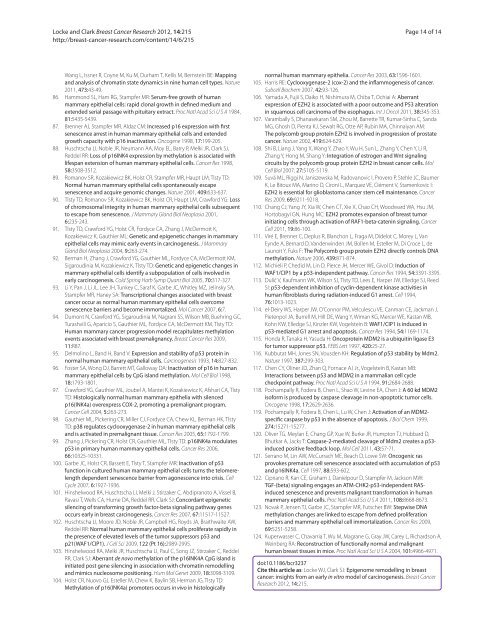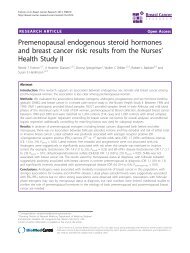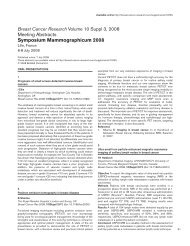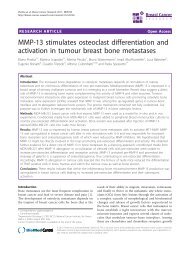PDF - Breast Cancer Research
PDF - Breast Cancer Research
PDF - Breast Cancer Research
Create successful ePaper yourself
Turn your PDF publications into a flip-book with our unique Google optimized e-Paper software.
Locke and Clark <strong>Breast</strong> <strong>Cancer</strong> <strong>Research</strong> 2012, 14:215<br />
http://breast-cancer-research.com/content/14/6/215<br />
Page 14 of 14<br />
Wang L, Issner R, Coyne M, Ku M, Durham T, Kellis M, Bernstein BE: Mapping<br />
and analysis of chromatin state dynamics in nine human cell types. Nature<br />
2011, 473:43-49.<br />
86. Hammond SL, Ham RG, Stampfer MR: Serum-free growth of human<br />
mammary epithelial cells: rapid clonal growth in defined medium and<br />
extended serial passage with pituitary extract. Proc Natl Acad Sci U S A 1984,<br />
81:5435-5439.<br />
87. Brenner AJ, Stampfer MR, Aldaz CM: Increased p16 expression with first<br />
senescence arrest in human mammary epithelial cells and extended<br />
growth capacity with p16 inactivation. Oncogene 1998, 17:199-205.<br />
88. Huschtscha LI, Noble JR, Neumann AA, Moy EL, Barry P, Melki JR, Clark SJ,<br />
Reddel RR: Loss of p16INK4 expression by methylation is associated with<br />
lifespan extension of human mammary epithelial cells. <strong>Cancer</strong> Res 1998,<br />
58:3508-3512.<br />
89. Romanov SR, Kozakiewicz BK, Holst CR, Stampf er MR, Haupt LM, Tlsty TD:<br />
Normal human mammary epithelial cells spontaneously escape<br />
senescence and acquire genomic changes. Nature 2001, 409:633-637.<br />
90. Tlsty TD, Romanov SR, Kozakiewicz BK, Holst CR, Haupt LM, Crawford YG: Loss<br />
of chromosomal integrity in human mammary epithelial cells subsequent<br />
to escape from senescence. J Mammary Gland Biol Neoplasia 2001,<br />
6:235-243.<br />
91. Tlsty TD, Crawford YG, Holst CR, Fordyce CA, Zhang J, McDermott K,<br />
Kozakiewicz K, Gauthier ML: Genetic and epigenetic changes in mammary<br />
epithelial cells may mimic early events in carcinogenesis. J Mammary<br />
Gland Biol Neoplasia 2004, 9:263-274.<br />
92. Berman H, Zhang J, Crawford YG, Gauthier ML, Fordyce CA, McDermott KM,<br />
Sigaroudinia M, Kozakiewicz K, Tlsty TD: Genetic and epigenetic changes in<br />
mammary epithelial cells identify a subpopulation of cells involved in<br />
early carcinogenesis. Cold Spring Harb Symp Quant Biol 2005, 70:317-327.<br />
93. Li Y, Pan J, Li JL, Lee JH, Tunkey C, Saraf K, Garbe JC, Whitley MZ, Jelinsky SA,<br />
Stampfer MR, Haney SA: Transcriptional changes associated with breast<br />
cancer occur as normal human mammary epithelial cells overcome<br />
senescence barriers and become immortalized. Mol <strong>Cancer</strong> 2007, 6:7.<br />
94. Dumont N, Crawford YG, Sigaroudinia M, Nagra ni SS, Wilson MB, Buehring GC,<br />
Turashvili G, Aparicio S, Gauthier ML, Fordyce CA, McDermott KM, Tlsty TD:<br />
Human mammary cancer progression model recapitulates methylation<br />
events associated with breast premalignancy. <strong>Breast</strong> <strong>Cancer</strong> Res 2009,<br />
11:R87.<br />
95. Delmolino L, Band H, Band V: Expression and stability of p53 protein in<br />
normal human mammary epithelial cells. Carcinogenesis 1993, 14:827-832.<br />
96. Foster SA, Wong DJ, Barrett MT, Galloway DA: Inactivation of p16 in human<br />
mammary epithelial cells by CpG island methylation. Mol Cell Biol 1998,<br />
18:1793-1801.<br />
97. Crawford YG, Gauthier ML, Joubel A, Mantei K , Kozakiewicz K, Afshari CA, Tlsty<br />
TD: Histologically normal human mammary epithelia with silenced<br />
p16(INK4a) overexpress COX-2, promoting a premalignant program.<br />
<strong>Cancer</strong> Cell 2004, 5:263-273.<br />
98. Gauthier ML, Pickering CR, Miller CJ, Fordyce CA, Chew KL, Berman HK, Tlsty<br />
TD: p38 regulates cy clooxygenase-2 in human mammary epithelial cells<br />
and is activated in premalignant tissue. <strong>Cancer</strong> Res 2005, 65:1792-1799.<br />
99. Zhang J, Pickering CR, Holst CR, Gauthier ML, Tlsty TD: p16INK4a modulates<br />
p53 in primary human mammary epithelial cells. <strong>Cancer</strong> Res 2006,<br />
66:10325-10331.<br />
100. Garbe JC, Holst CR, Bassett E, Tlsty T, Stampfer MR: Inactivation of p53<br />
function in cultured h uman mammary epithelial cells turns the telomerelength<br />
dependent senescence barrier from agonescence into crisis. Cell<br />
Cycle 2007, 6:1927-1936.<br />
101. Hinshelwood RA, Huschtscha LI, Melki J, Stirzaker C, Abdipranoto A, Vissel B,<br />
Ravasi T, Wells C A, Hume DA, Reddel RR, Clark SJ: Concordant epigenetic<br />
silencing of transforming growth factor-beta signaling pathway genes<br />
occurs early in breast carcinogenesis. <strong>Cancer</strong> Res 2007, 67:11517-11527.<br />
102. Huschtscha LI, Moore JD, Noble JR, Campbell HG, Royds JA, Braithwaite AW,<br />
Reddel RR: Normal hum an mammary epithelial cells proliferate rapidly in<br />
the presence of elevated levels of the tumor suppressors p53 and<br />
p21(WAF1/CIP1). J Cell Sci 2009, 122 (Pt 16):2989-2995.<br />
103. Hinshelwood RA, Melki JR, Huschtscha LI, Paul C, Song JZ, Stirzaker C, Reddel<br />
RR, Clark SJ: Aberrant de novo methylation of the p16INK4A CpG island is<br />
initiated post gene silencing in association with chromatin remodelling<br />
and mimics nucleosome positioning. Hum Mol Genet 2009, 18:3098-3109.<br />
104. Holst CR, Nuovo GJ, Esteller M, Chew K, Baylin SB, Herman JG, Tlsty TD:<br />
Methylation of p16(INK4 a) promoters occurs in vivo in histologically<br />
normal human mammary epithelia. <strong>Cancer</strong> Res 2003, 63:1596-1601.<br />
105. Harris RE: Cyclooxygenase-2 (cox-2) and the inflammogenesis of cancer.<br />
Subcell Biochem 2007, 42 :93-126.<br />
106. Yamada A, Fujii S, Daiko H, Nishimura M, Chiba T, Ochiai A: Aberrant<br />
expression of EZH2 is asso ciated with a poor outcome and P53 alteration<br />
in squamous cell carcinoma of the esophagus. Int J Oncol 2011, 38:345-353.<br />
107. Varambally S, Dhanasekaran SM, Zhou M, Barrette TR, Kumar-Sinha C, Sanda<br />
MG, Ghosh D, Pienta KJ , Sewalt RG, Otte AP, Rubin MA, Chinnaiyan AM:<br />
The polycomb group protein EZH2 is involved in progression of prostate<br />
cancer. Nature 2002, 419:624-629.<br />
108. Shi B, Liang J, Yang X, Wang Y, Zhao Y, Wu H, Sun L, Zhang Y, Chen Y, Li R,<br />
Zhang Y, Hong M, Sh ang Y: Integration of estrogen and Wnt signaling<br />
circuits by the polycomb group protein EZH2 in breast cancer cells. Mol<br />
Cell Biol 2007, 27:5105-5119.<br />
109. Suvà ML, Riggi N, Janiszewska M, Radovanovic I, Provero P, Stehle JC, Baumer<br />
K, Le Bitoux MA, M arino D, Cironi L, Marquez VE, Clément V, Stamenkovic I:<br />
EZH2 is essential for glioblastoma cancer stem cell maintenance. <strong>Cancer</strong><br />
Res 2009, 69:9211-9218.<br />
110. Chang CJ, Yang JY, Xia W, Chen CT, Xie X, Chao CH, Woodward WA, Hsu JM,<br />
Hortobagyi GN, Hung MC: EZ H2 promotes expansion of breast tumor<br />
initiating cells through activation of RAF1-beta-catenin signaling. <strong>Cancer</strong><br />
Cell 2011, 19:86-100.<br />
111. Viré E, Brenner C, Deplus R, Blanchon L, Fraga M, Didelot C, Morey L, Van<br />
Eynde A, Bernard D, Vand erwinden JM, Bollen M, Esteller M, Di Croce L, de<br />
Launoit Y, Fuks F: The Polycomb group protein EZH2 directly controls DNA<br />
methylation. Nature 2006, 439:871-874.<br />
112. Michieli P, Chedid M, Lin D, Pierce JH, Mercer WE, Givol D: Induction of<br />
WAF1/CIP1 by a p53-independ ent pathway. <strong>Cancer</strong> Res 1994, 54:3391-3395.<br />
113. Dulić V, Kaufmann WK, Wilson SJ, Tlsty TD, Lees E, Harper JW, Elledge SJ, Reed<br />
SI: p53-dependent inh ibition of cyclin-dependent kinase activities in<br />
human fibroblasts during radiation-induced G1 arrest. Cell 1994,<br />
76:1013-1023.<br />
114. el-Deiry WS, Harper JW, O’Connor PM, Velculescu VE, Canman CE, Jackman J,<br />
Pietenpol JA, Burrell M, Hil l DE, Wang Y, Wiman KG, Mercer WE, Kastan MB,<br />
Kohn KW, Elledge SJ, Kinzler KW, Vogelstein B: WAF1/CIP1 is induced in<br />
p53-mediated G1 arrest and apoptosis. <strong>Cancer</strong> Res 1994, 54:1169-1174.<br />
115. Honda R, Tanaka H, Yasuda H: Oncoprotein MDM2 is a ubiquitin ligase E3<br />
for tumor suppressor p53. FEBS Lett 1997, 420:25-27.<br />
116. Kubbutat MH, Jones SN, Vousden KH: Regulation of p53 stability by Mdm2.<br />
Nature 1997, 387:299-303.<br />
117. Chen CY, Oliner JD, Zhan Q, Fornace AJ Jr., Vogelstein B, Kastan MB:<br />
Interactions between p53 and MDM2 in a mammalian cell cycle<br />
checkpoint pathway. Proc Natl Acad Sci U S A 1994, 91:2684-2688.<br />
118. Pochampally R, Fodera B, Chen L, Shao W, Levine EA, Chen J: A 60 kd MDM2<br />
isoform is produced by caspas e cleavage in non-apoptotic tumor cells.<br />
Oncogene 1998, 17:2629-2636.<br />
119. Pochampally R, Fodera B, Chen L, Lu W, Chen J: Activation of an MDM2-<br />
specific caspase by p53 in the ab sence of apoptosis. J Biol Chem 1999,<br />
274:15271-15277.<br />
120. Oliver TG, Meylan E, Chang GP, Xue W, Burke JR, Humpton TJ, Hubbard D,<br />
Bhutkar A, Jacks T: Caspase-2-m ediated cleavage of Mdm2 creates a p53-<br />
induced positive feedback loop. Mol Cell 2011, 43:57-71.<br />
121. Serrano M, Lin AW, McCurrach ME, Beach D, Lowe SW: Oncogenic ras<br />
provokes premature cell senescence as sociated with accumulation of p53<br />
and p16INK4a. Cell 1997, 88:593-602.<br />
122. Cipriano R, Kan CE, Graham J, Danielpour D, Stampfer M, Jackson MW:<br />
TGF-{beta} signaling engages an AT M-CHK2-p53-independent RASinduced<br />
senescence and prevents malignant transformation in human<br />
mammary epithelial cells. Proc Natl Acad Sci U S A 2011, 108:8668-8673.<br />
123. Novak P, Jensen TJ, Garbe JC, Stampfer MR, Futscher BW: Stepwise DNA<br />
methylation changes are linked to escape from defined proliferation<br />
barriers and mammary epithelial cell immortalization. <strong>Cancer</strong> Res 2009,<br />
69:5251-5258.<br />
124. Kuperwasser C, Chavarria T, Wu M, Magrane G, Gray JW, Carey L, Richardson A,<br />
Weinberg RA: Reconstructi on of functionally normal and malignant<br />
human breast tissues in mice. Proc Natl Acad Sci U S A 2004, 101:4966-4971.<br />
doi:10.1186/bcr3237<br />
Cite this article as: Locke WJ, Clark SJ: Epigenome remodelling in breast<br />
cancer: insights from an early in vitro model of carcinogenesis. <strong>Breast</strong> <strong>Cancer</strong><br />
<strong>Research</strong> 2012, 14:215.






